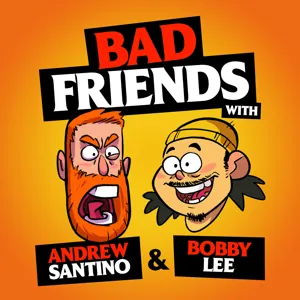Podcast Summary
Humanizing the immigrant experience through comedy: Comedian Maeve Higgins uses her personal experiences to challenge stereotypes and encourage empathy through her humor. Her dedication to using her platform for positive impact is evident in her pursuit of a master's degree in migration studies.
Comedy, particularly when used by immigrants like Maeve, has the power to challenge and change perspectives on complex issues like immigration. Maeve's humor uses her personal experiences to complicate stereotypes and encourage empathy. Her joke about the pressure of winning an immigrant achievement award in comparison to her own forgetfulness highlights the absurdity of such labels. Overall, Maeve's comedy serves to humanize the immigrant experience and encourage a more nuanced understanding of immigration. Additionally, Maeve's decision to pursue a master's degree in migration studies despite a successful acting career showcases her dedication to using her platform to make a positive impact on the world.
A comedian's perspective on immigration and humor: Comedian Maeve Higgins shares how her personal experience as an immigrant influenced her comedy and the importance of finding common ground and humor in shared experiences, even serious issues like immigration.
Comedy and serious issues, such as immigration, can be interconnected. Maeve Higgins, a comedian and writer, shares her personal experience as an immigrant and how it influenced her comedy. She grew up in Ireland, where her community had a history of immigration, but it wasn't until she experienced migration herself that she began to understand and find humor in it. Higgins obtained a special visa, the O-1 visa, which is for individuals with extraordinary abilities. She acknowledges the privilege of her situation and the value of various contributions, even those considered less significant, like comedy. However, she warns against dividing humans based on who deserves to be where and who's allowed to move across borders, as it can lead to ugly outcomes. Higgins's journey highlights the power of finding common ground and humor in shared experiences, even the most serious ones.
Comedy's Value as a Form of Self-Expression and Connection: Comedy provides relief, fosters connections, and allows individuals to express unique perspectives. Despite skepticism, it remains an essential outlet for understanding and appreciating diverse experiences.
Comedy, as a form of self-expression, holds significant value in our lives. It serves as a means for individuals to express their unique perspectives and connect with others, fostering a sense of community. Comedy can also provide relief and release, bringing people together in shared laughter. Despite skepticism about its ability to directly change societal norms, comedy remains an essential outlet for self-expression and a powerful tool for building connections. The speaker's experience with comedy and the complexities of immigration illustrate this idea, as they highlight the importance of understanding and appreciating diverse perspectives. The speaker's Irish background adds another layer to this discussion, as they reflect on the shifting attitudes towards immigration and the role of personal experiences in shaping our perceptions. Overall, comedy's ability to provoke thought, foster connections, and provide relief makes it an invaluable part of our cultural landscape.
Imagining a Different Perspective on Borders and Immigration: Use imagination to understand historical context, advocate for compassionate policies, educate yourself, and support organizations to create a more inclusive world.
Our perspective on borders and immigration can be changed by using our imagination and recognizing the historical context behind their existence. People like Mike Pence, who have personally benefited from migration, can also advocate for more compassionate policies. Regular people can take concrete steps to make a difference, such as educating themselves about current issues and supporting organizations that help those affected by immigration policies. By challenging the notion that the current situation is unchangeable, we can imagine and work towards a more inclusive and equitable world.
Support Existing Organizations for Meaningful Impact: Collaborate with established organizations to understand unique community needs and make more effective contributions.
Instead of trying to single-handedly start a new initiative to help those in need, it's often more effective to support existing organizations. This approach allows you to avoid being perceived as a savior and ensures that you're addressing the specific needs of the community. For instance, when it comes to helping immigrants, it's crucial to understand that different groups have unique requirements. Therefore, it's essential to check in with them and offer assistance accordingly. In summary, collaborating with established organizations and listening to the needs of the community can lead to more meaningful and impactful contributions.
The value of immigrants goes beyond financial contributions: Comedy highlights the unique experiences and perspectives of immigrants, shedding light on overlooked stories and cultural differences.
The worth of an immigrant should not be measured or judged based on their financial contributions or accomplishments. Immigrants, like Annie Moore, do not need to prove themselves extraordinary to deserve a place in society. Comedy, as demonstrated by the speaker's work, has the power to bring attention to important issues and shine a light on overlooked perspectives. The speaker's book, "Tell Everyone on This Train I Love Them," uses humor to explore immigration stories and the unique experiences of immigrants and their families. The idea for the book came from the speaker's observation of the different worlds immigrants and their families come from and the fascinating glimpses they provide into those realities. The speaker's experiences, such as encountering a large parking lot for the first time, highlight the importance of recognizing and appreciating cultural differences. Comedy can help bridge the gap and bring attention to important issues that might otherwise be overlooked.
Recognizing the Complexity of Immigrants: Embrace the intricacy of immigrants' stories and resist oversimplified narratives. Engage in open-minded conversations and appreciate unique perspectives.
It's essential to recognize the complexity and individuality of immigrants, rather than reducing them to simplistic stereotypes. During a yearly gathering, the speaker was struck by the diversity and intricacy of the people she met. She witnessed a raffle for homemade rifles, which was both comical and alarming, highlighting the nuanced experiences of immigrants. The speaker emphasized the need to resist oversimplified narratives about immigrants as criminals, victims, or hard workers. Instead, we should engage in open-minded conversations and appreciate the unique stories and perspectives of individuals. One of the speaker's favorite experiences was interacting with a 10-year-old girl in Virginia, who shared her thoughts on the removal of Confederate statues. This encounter underscored the importance of understanding the richness and complexity of people's experiences and beliefs.
Appreciating small moments of joy and connection in immigration stories: Educate yourself about immigration laws and their implications to foster a better understanding of complex issues
It's essential to recognize and appreciate the small moments of joy and connection in the midst of larger, historic issues, such as immigration and borders. These moments can provide valuable insights into people's experiences and help humanize complex issues. For instance, a black girl's sense of ownership and freedom in claiming her living space, an Iraqi asylum seeker's creativity in making a mermaid costume, and Annie Moore's determination as the first immigrant at Ellis Island. To make a positive impact, individuals can educate themselves about immigration laws, their historical context, and their daily implications. By doing so, we can foster a better understanding of the complexities and nuances surrounding immigration and borders.
Engaging with immigrants and asylum seekers for successful integration: Community sponsorship, building connections, accurate information, self-care contribute to successful immigrant integration. Imagining a better world and dismantling oppressive systems are essential steps.
Engaging with immigrants and asylum seekers can make a significant difference in their integration into society. Community sponsorship, where communities sponsor immigrants together, has been proven effective. Building connections and providing support can lead to successful integration. It's important to question sources of information and seek out accurate and balanced immigrant stories. Remember to imagine and create the world you desire, while also dismantling oppressive systems. The goal is to build a better world and replace the current one with it. Additionally, taking care of yourself and practicing self-compassion can help you be a better human. Small acts of relaxation and enjoying life can contribute to your worth, not just your productivity. A quote from Ruha Benjamin, "remember to imagine and craft the world you cannot live without, just as you dismantle the ones you cannot live within," is a powerful reminder to focus on building a better future while addressing current issues.
Expressing love and kindness can make a difference: Small acts of kindness can have a ripple effect on others, make sure to express love and kindness to those around you.
The importance of expressing love and kindness to those around us. Maeve Higgins, the author of "Tell Everyone on This Train I Love Them," emphasized the significance of small acts of kindness and the ripple effect they can have on others. The show was brought to you by a talented team, including international dream teams Sammy Case, Anna Phelan, and Abhimanyu Das, as well as producers Wilson Sayer, Leila Das, Farah de Grange, Jocelyn Gonzalez, and Sandra Lopez Monsalve. Support for the show comes from Odoo, offering affordable, all-in-one management software, and Brooks Running, providing high-quality, lightweight running shoes. So, remember, expressing love and kindness can make a big difference, and make sure to check out Odoo and Brooks Running for tools to help you manage your life and stay active.






